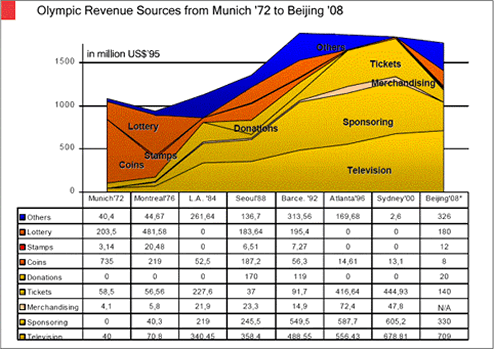|
During the past 100 years, each Olympics has been financed
in a different manner, trends in Olympic financing are highlighted
below.
1895-1965
Restriction of the Olympic events to amateur athletes and
the high cost of international travel at the time kept the
first Olympic games small. Because of this, the macroeconomic
impact of the games was negligible. A sense of commercial
naiveity seems to characterise the early games where the
focus seems to have been on playing sport rather than money
making
1969-1980
This period is characterised by an increase in the popularity
of the games, this made it necessary to find new sources
of funding to support the organisation of the games. The
increase in the influence of the mass media during this period
led to the emergence of TV rights and sponsorship as important
sources of revenue for the games. The period also marks the
dawning realisation that the Olympics can have a long-term
economic impact on the host city both in a negative manner
through the economic burden incurred through Olympic debt
and in a positive manner through investment in the public
infrastructure of the host city.
1981-2000
The debt incurred by the citizens of Montreal awakened citizens
to the economic cost of hosting the Olympic Games. Games
held at Seoul in 1988, Barcelona in 1992 and Sydney in 2000
all adopted a mixed financing model using money both from
the state and from private enterprise to underpin the operational
and investment costs. This approach attempts to balance the
interests of all the Olympic stakeholders (inc. IOC, OCOG,
Citizens, Athletes).
These different financial dimensions can be seen from the
graph below.

An important distinction must be made between the Operational
revenues from the games and investment income designed to
boost the infrastructure of the host city. Operational revenues
have come from a range of different source as shown in the
figure below

Two important sources of Olympic revenue are the sale of
television rights and Olympic sponsorship programs. Realising
the role of TV Rights in securing long-term revenues for
the Olympic movement, the IOC has assumed the role of chief
negotiator and benefactor. Olympic marketing also forms a
prominent part of revenues from the games. The proliferation
of commercial involvement in the games through sponsorship
has led to allegations of over-commercialisation. This is
discussed in detail in our report alongside the problem of
Olympic corruption.
|


